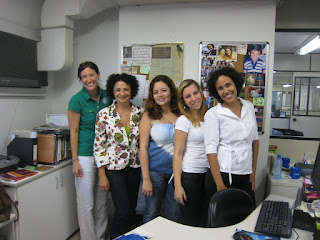Our first week in Brazil has been a flurry of activity. We´ve been very busy seeing the sights and learning about Vitoria and the surrounding cities. My vocational visits started on Tuesday with a packed day.
First I visited the communications department of Banestes State Bank. Banestes is a large bank with branches located throughout the state of Espiritu Santo. For such a large company I was surpised to find only two full time staff (called, journalists) work in the communications department.
First I visited the communications department of Banestes State Bank. Banestes is a large bank with branches located throughout the state of Espiritu Santo. For such a large company I was surpised to find only two full time staff (called, journalists) work in the communications department.

Dora Daimasio, a spunky woman who has many, many years of experience working for newspapers and companies, is the president of the communications department. Her role is to deal with all of the incoming media inquires. Anything a reporter might want in terms of information about the bank goes to Dora. She is described as ^The Voice of the Bank^. And like all journalists, when Dora got into the office, it was like a tornado of activity from the start. Checking emails and answering phone calls is non stop. The first call of the morning was from a tv reporter asking for footage of one of the bank branches that had been robbed.
Dora´s sidekick in the communications department is Juliana Rodriques. An entergetic young woman who has lived in both New York and Arizona and speaks perfect English. Juliana´s role in the company is to produce all of the internal communications for the bank. Each month, she puts out a company newsletter in addition to other communication bulletins.
Dora´s sidekick in the communications department is Juliana Rodriques. An entergetic young woman who has lived in both New York and Arizona and speaks perfect English. Juliana´s role in the company is to produce all of the internal communications for the bank. Each month, she puts out a company newsletter in addition to other communication bulletins.

Throughout the day a number of college students majoring in communications and journalism filtered throughout the office. The students work in the office, much like an internship, when they are not in school. They catalog articles and even do some of the writing.
The roles within the communications department are very similar to companies in the US, as well as the role of the journalists working in the office. Much time is spent on the computer answering emails, making calls and interviewing sources and of course, writing articles. Also similar to the states, the communications department was much smaller, with the corresponding budget, while the marketing department was much larger and a much bigger budget.
I asked Juliana, who is in the midst of taking courses related to social networking and journalism, if the bank uses such media as twitter and facebook. She said that they have talked about it, but their deparment is so small and there is just too much work to have someone dedicated to doing these extra tasks full time. Also similar to the US, Juliana confirmed that journalists who work for newspapers (in smaller cities) don´t make all that much money. But journalists who work for private companies can make a little more.
The visit was wonderful and a great peak into the world of corporate communications in Brazil. One of the highlights included a great mid-day lunch at a downtown self service restaurant with the best cheese crepes. Yum!
After spending 5 hours at the Bank (and writing a report for Dora about my day), I went to visit Rede Gazeta, a media company in Vitoria that owns newspapers, tv stations, radio stations and websites. Ahh... back to my roots as a newspaper reporter!!
The tour was very interesting to me and I was surprised to find it very similar to news organizations I had visited in Chicago like The Chicago Tribune, The Sun Times, NPR and CBS stations while I was in my journalism masters program. Of course the best part for me was seeing the buzz of energy that ignites a newsroom right before a deadline. People madly pounding away on their keyboards, finishing their edits and frantically calling to get those last minute quotes! I love it. The reporters sit very close together at long desks with computers at the ready.

I was suprised when our gracious host Leticia Lindenberg de Azevedo explained that unlike in the States the newspapers (2 under her companys control) are thriving. Rather than laying people off due to lack of readership, the number of subscribers has actually grown. One of the reasons Leticia gave for this is because Brazil is in the midst of change. More people are getting a better education which not only means more people who read, but also people with better jobs and more money. While these people might not yet be rich, they are a prime market for newspapers because they do not all have access to the internet, which has killed so many newspapaers in the US.
I was very impressed with both of my communications and journalism-centered visits. I can´t get over how gracious and wonderful the Brazilian people are!
My next visits will be to two non profit organizations. Until then....



No comments:
Post a Comment